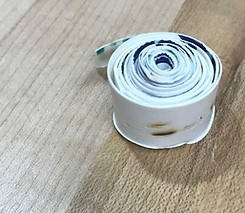Mandy Rosengren
mandyrosengren@gmail.com
What is cupcycle
Cupcycle was developed by Mandy Rosengren, Katie Melsky and Chris Colcord for the Senior Design Project in Fall 2019 at Tufts University. Cupcycle transforms a paper coffee cup into coasters and mosaics. Currently, few paper coffee cups can be recycled due to the thin layers of plastic or wax that prevent water from seeping through the cup. However, in Cupcycle this liner acts as a glue to keep the shape of the coasters.
Initial Sketches
During the design process, the team went through multiple iterations. The sketches drawn by Mandy Rosengren below show the four iterations and the eventual design chosen.

Design 1

In the initial sketch, the user would place the paper coffee cup onto a platform. As it rotates, a blade cuts the cup into a long strip and spins this into a spiraled coaster.

Design 2a

Design 2 focused on condensing Design 1 and controlling the system with a crank. The cup rotates on a power screw and a blade cuts the cup which rotates on two pegs, and heat is added to adhese the cup to itself.

Design 2b

These sketches that I made focus on the different sections of the machine and my brainstorms on ways to create that section.

Final Design

This was my sketch of the final chosen design. The cup would be placed near the blade. The user would hold *clippers and pull the cup through the blade and down a path confined in the x direction. Then the user would spin the clippers near the heating element to create the coaster.
Initial Prototypes
Shown below are some of the initial prototypes developed when following Design 2. The materials developed in the prototypes include wood, PLA, TPU, nails, hot glue, springs, blades and tape.

Cup Holder and Power Screw

Initially, we planned to mount the cup to a power screw that would be driven by a hand crank, similar in design to manual apple peelers. The cup would be sliced into a long strip by a fixed blade.

Push Design

We had planned to mount several prongs to the second shaft so that the strip would pass between the prongs and coil over on itself. However, the strip that we were cutting was flimsy and moved unpredictably, making it difficult to feed between the prongs.

Pull Design

This prototype of the final design included a springed platform to hold the cup, a forcep to pull the cup across the blade and acted as the prongs to create the spiraled coaster.
Design 2 in Motion
This video shows how the rotation of the power screw and the coffee cup results in cutting the cup with the blade and rotates the dowel that has the pegs to coil the cup ribbon.

Cutting Mechanism

Rather than “push” the cup through the blade with a power screw, we decided to attach the cup to a fixed point and then pull it through the blade. Once the cutting began, the strip would then be wound around the fixed point to form the coaster.
Cutting Mechanism
This video shows how the blade cuts the cup. Many issues arose with the strip ripping. To prevent this, the strip had to be flush with the blade platform.
Final Design
In our final design, the user places the cup in place and clamps the forceps onto the edge of the cup. They then slide the crank assembly on a set of rails, which drags the cup through the blade and cuts it into a thin strip. The crank assembly locks in place at the end of the rails, allowing the user to turn the crank to continue cutting the cup. As the crank turns, the strip coils around itself and presses against a spring-loaded soldering iron. The iron seals the strip to prevent uncoiling. Once the cup is completely cut, the user releases the forceps and slides the coiled coaster off of the crank mechanism.

Final
Design

Cupcycle
in Action
